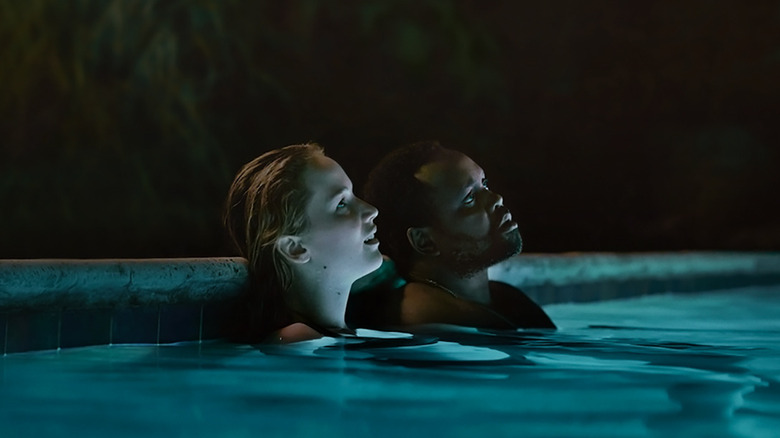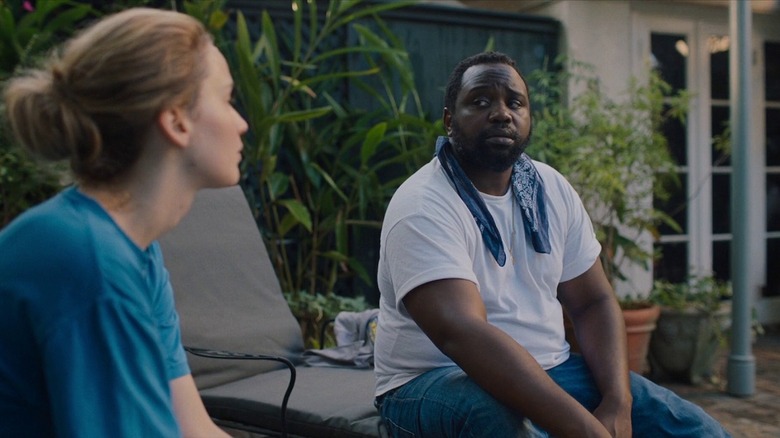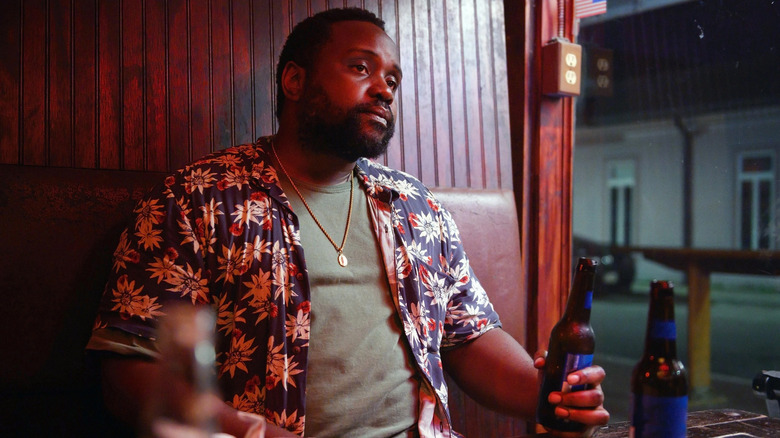In Causeway, Brian Tyree Henry Found A Beautifully Tragic Connection Between Amputees And Losing A Loved One [Exclusive]
Brian Tyree Henry is one of the most brilliantly resourceful actors working today. A Yale School of Drama graduate, he made his bones on the New York City theater scene with acclaimed performances in the 2007 Shakespeare in the Park production of "Romeo Juliet" and Tarell Alvin McCraney's "The Brother/Sister Plays." He gradually segued to television, booking roles on prestigious shows like "Boardwalk Empire" and "The Knick" before blowing up as Paper Boi on Donald Glover's "Atlanta." His big-screen coming out party arrived in 2018 with memorable performances in Steve McQueen's "Widows" and, most piercingly, Barry Jenkins' "If Beale Street Could Talk."
Henry has been doing it well enough, long enough that it's beginning to get a tad disconcerting that he's yet to win a major award for his work. This might be about to change thanks to his incredibly nuanced portrayal of a quietly haunted auto mechanic named James in Lila Neugebauer's "Causeway." The film centers on the rocky recovery of Lynsey (Jennifer Lawrence), a U.S. Army soldier dealing with a traumatic brain injury incurred in Afghanistan. Lynsey strikes up an unlikely friendship with James, which sets the stage for an acting showcase that's refreshingly light on histrionics. These performers can't help but make interesting choices, and this makes their every scene together a strangely charged tightrope walk.
While James wasn't a natural fit for Henry, he connected to his character's trauma, which derives from an accident that resulted in the amputation of his leg from the knee down, by accessing some of his own.
Living with phantoms
In an interview with /Film's Ethan Anderton, Henry revealed that his research into the recovery of amputees led him to examine his own sense of loss. "There's this thing that amputees have called the phantom limb syndrome," he said, "Which is basically, for a long period of time, even I think for the rest of your life, you feel like that limb is there." Indeed, amputees often feel an itch on the excised extremity that can't be scratched. Henry likened this sensation to coping with the death of a loved one. As he told Anderton:
"When you lose somebody, it is so permanent, and your mind can't really wrap your brain around that. You constantly still think and move and act as if though that person still exists. I still, to this day, oftentimes look at my phone and think to call my mother, and I'm like, 'Wait, I can't do that. She's no longer here.' We still save voicemails. We still leave rooms the same way that these people once lived in as a way to hold on to them, right? So I found, with James, that he was doing the same thing. For James to have suffered a huge car accident the way he did that resulted in him losing his limb and losing a life, he still drives around. He still works as a car mechanic. This man is still fixing cars for people and he still lives in the same home that was once inhabited by these people that are no longer there."
Healing through acting
Portraying James became an education of sorts for Henry, primarily because the character's choices seemed emotionally irrational. Despite his trauma, he's still living in a situation and working a job that reminds him every day of his heartbreak. By interrogating this, Henry found a measure of assuagement for his own grief. "In essence, James was really helping me figure out that mindset of that kind of strength, that kind of resiliency, and that true human connections are still possible beyond grief. I think that is a big part that I wanted to display as well, not just for his healing, but for my own."
This is what the great actors do. They get on the wavelength of a puzzling, seemingly misguided character and, if the writing is true, learn from them. Sometimes they learn what not to do, but in the case of James, it sounds like Henry gained a valuable perspective that he'll carry with him for the rest of his days. The connection is palpable, so it's hardly a surprise that the Independent Spirit Awards have nominated Henry for Best Supporting Performance. Nominations are nothing new for Henry. Let's get my man a win this time out.


